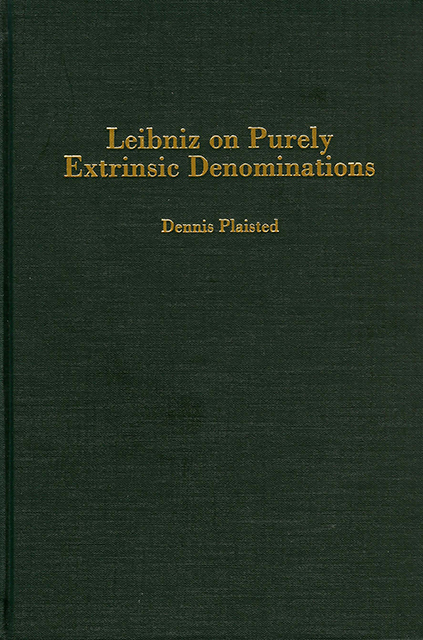Book contents
- Frontmatter
- Dedication
- Contents
- Acknowledgments
- Introduction
- Chapter One Two Views of Purely Extrinsic Denominations
- Chapter Two Truth and Purely Extrinsic Denominations
- Chapter Three Extrinsic Denominations and Where Accidents Are Allowed to Put Their Feet
- Chapter Four Extrinsic Denominations and the Interconnection of All Things
- Chapter Five Extrinsic Denominations and the Foundations of Relations
- Chapter Six Extrinsic Denominations and the Claim that Every Monad Expresses the Universe
- Appendix A Critique of Massimo Mugnai’s Version of NPE
- References
- Abbreviations
- Notes
- Index
Chapter Six - Extrinsic Denominations and the Claim that Every Monad Expresses the Universe
Published online by Cambridge University Press: 25 March 2023
- Frontmatter
- Dedication
- Contents
- Acknowledgments
- Introduction
- Chapter One Two Views of Purely Extrinsic Denominations
- Chapter Two Truth and Purely Extrinsic Denominations
- Chapter Three Extrinsic Denominations and Where Accidents Are Allowed to Put Their Feet
- Chapter Four Extrinsic Denominations and the Interconnection of All Things
- Chapter Five Extrinsic Denominations and the Foundations of Relations
- Chapter Six Extrinsic Denominations and the Claim that Every Monad Expresses the Universe
- Appendix A Critique of Massimo Mugnai’s Version of NPE
- References
- Abbreviations
- Notes
- Index
Summary
I. Introduction
In this chapter, I examine NPE’s role as a premise in an argument that Leibniz offers to establish his famous claim that every monad expresses or mirrors the universe. The approach of this chapter, as in the previous ones, will be to reconstruct the argument both with NPE read as (6) and with it read reductionistically. Consideration of the argument is complicated by the fact that its conclusion—that every monad expresses the universe—is itself not entirely clear. It is relatively certain from Leibniz’s writings that in order for a monad to express the universe, one must be able to infer from that monad’s properties every property of every other monad in that universe. What is not so clear is how the monad’s properties permit one to obtain this vast amount of information. The fact that Leibniz argues from NPE to the doctrine of expression suggests that a monad’s extrinsic denominations, in some manner, play a vital role in its expression of the universe. It could be that if extrinsic denominations are genuine properties of what they denominate, then, since those denominations have the complete concepts of other individuals as components, one could obtain complete information about those other individuals simply by examining the extrinsic denominations of a single individual. This is, of course, in keeping with my reading of NPE and, as will be seen, is central to my rendering of how Leibniz derives expression from NPE. On the other hand, for a reductionist, although a monad’s extrinsic denominations are crucially involved in its expression of the universe, they are not involved by being genuine properties of what they denominate. It seems, rather, that they would be involved in expression because they reduce to features of a thing that are genuine properties, and this is presumably how the reductionist version of NPE might imply monadic expression.
The focus of this chapter will be to determine which view of NPE leads more plausibly to the doctrine of expression. In section II, I present Leibniz’s descriptions of the general notion of expression and discuss some of the interpretations of that notion given by interpreters. In section III, I discuss two features of monadic expression that are relevant to reconstructing the argument from NPE to monadic expression. The first is that monads do express the universe in some way through their extrinsic denominations.
- Type
- Chapter
- Information
- Leibniz on Purely Extrinsic Denominations , pp. 83 - 98Publisher: Boydell & BrewerPrint publication year: 2002



